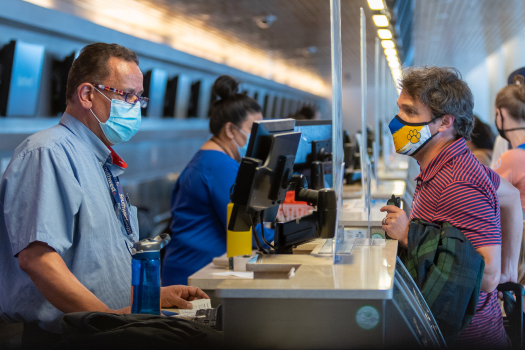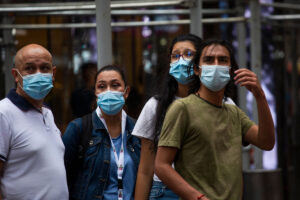I hate that I believe the sentence I’m about to write. It undermines much of what I spend my life trying to do. But there is nothing more overrated in politics — and perhaps in life — than the power of persuasion.
It is nearly impossible to convince people of what they don’t want to believe. Decades of work in psychology attest to this truth, as does most everything in our politics and most of our everyday experience. Think of your own conversations with your family or your colleagues. How often have you really persuaded someone to abandon a strongly held belief or preference? Persuasion is by no means impossible or unimportant, but on electric topics, it is a marginal phenomenon.
Which brings me to the difficult choice we face on coronavirus vaccinations. The conventional wisdom is that there is some argument, yet unmade and perhaps undiscovered, that will change the minds of the roughly 30% of American adults who haven’t gotten at least one dose. There probably isn’t. The unvaccinated often hold their views strongly, and many are making considered, cost-benefit calculations given how they weigh the risks of the virus, and the information sources they trust to inform them of those risks. For all the exhortations to respect their concerns, there is a deep condescension in believing that we’re smart enough to discover or invent some appeal they haven’t yet heard.
If policymakers want to change their minds, they have to change their calculations by raising the costs of remaining unvaccinated, the benefits of getting vaccinated, or both. If they can’t do that, or won’t, the vaccination effort will most likely remain stuck — at least until a variant wreaks sufficient carnage to change the calculus.
You can see the weakness of persuasion in the eerie stability of vaccination preferences. The Kaiser Family Foundation has been surveying Americans about their vaccination intentions since December. At that time, 15% said they would “definitely” refuse to get vaccinated, 9% said they would get a shot only “if required,” and 39% wanted to “wait and see.”
Six months later, Kaiser asked the same question. By then, most of the wait-and-see crowd had seen enough to get vaccinated. The only-if-required crew shrank, but only by a bit: 6% of Americans were still waiting on a mandate. But the definitely-notters had barely budged: They numbered 15% in December and 14% in June.
With Delta supercharging transmission among the unvaccinated, the debate now is how to persuade them to get a shot (or two).
Emmanuel Macron, the president of France, proposed a law requiring either proof of vaccination or a negative test result for many indoor activities. The mere prospect of a vaccine mandate set off mass protests. It also led to a surge in vaccinations. On July 1, 50.8% of the French population had gotten at least one shot — putting France 3.5 points behind America. By Sunday, 59.1% of France had been at least partially vaccinated, putting it 2.7 points ahead of us.
A number of American employers are following suit. California and New York will require proof of vaccination or routine negative test results for all state employees. Around 600 college campuses have announced that they’ll require vaccinations for students returning in the fall.
There is nothing new about this. We do not solely rely on argumentation, for example, to persuade people to wear seat belts.
Though I’d like to believe otherwise, I don’t think our politics can support a national vaccination mandate. The places that would most benefit from a mandate would be those most opposed to following one, and deepening partisan divisions here would be catastrophic. Quickly building the records and testing options for individual employers to take the first steps seems like the right middle ground, at least for now.
Making it more annoying to be unvaccinated won’t persuade everyone to get a shot. But we don’t need everyone. According to Kaiser’s data, 16% of American adults are still in the wait-and-see or only-if-required categories. If they all got vaccinated, we’d hit herd immunity in most places.
If we keep permitting the virus to dance across the defenseless, we could soon have a strain that evades vaccines while retaining lethality, or that attacks children with more force. Over and over again throughout this pandemic, the same pattern has played out: We haven’t done enough to suppress the virus when we still could, so we have had to impose far more draconian lockdowns and grieve far more death, once we have lost control. For this reason among many, I urge those who object to vaccination passports as an unprecedented stricture on liberty to widen their tragic imagination.
Ezra Klein is a New York Times columnist.



















